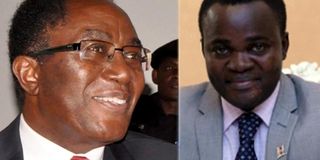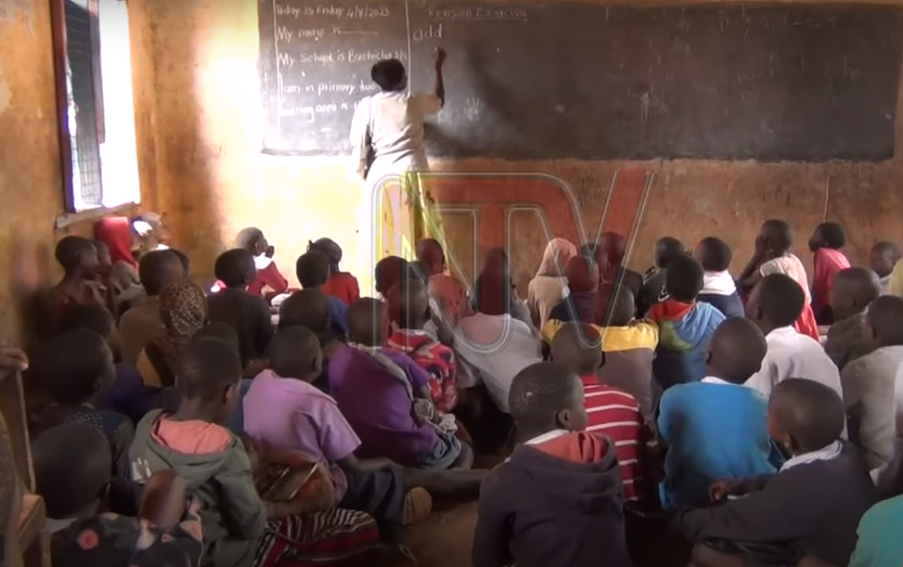Makerere staff oppose Shs300m payment to probe committee

The university VC Prof John Ssentamu Ddumba (L) and Dr Deus Kamunyu Muhwezi
What you need to know:
- In 2015, an internal Makerere University probe confirmed that at least 418 students manipulated the records system and had their results illegally altered for better grades either with the help of their colleagues or in connivance with university officials.
- The committee was planning to have 40 hearings, where Shs240m would be spent on the other members, while the chairperson would get Shs26million; stationery would cost Shs500,000; compilation of documentary evidence was going for Shs5 million; Shs8.5 million was budgeted for airtime and advertisement; report production (Shs4 million) and Shs8.9 million on food and drinks.
KAMPALA. Makerere University Academic Staff Association (Muasa) members are agitated that their managers have advanced colossal sums of money to a single committee without considering their welfare.
On January 12, 2017, Makerere University vice chancellor, Prof John Ssentamu Ddumba, wrote to the university secretary, Mr Charles Barugahare, reminding him that three years had passed since the committee set up to investigate the alteration of marks scandal could report.
“… The committee has to-date not completed work due to lack of facilitation. This is to request that initial payment of at least Shs80 million is made to fast-track the committee’s work,” Prof Ddumba wrote.
The academic staff association has greeted the payment with dismay considering that the institution has been closed for two months. The authorities claimed that that there was no money to clear staff incentive allowance arrears resulting in a staff sit-down strike.
The contention
Dr Deus Kamunyu Muhwezi, the MUASA spokesperson, on Thursday said: “The money they are spending doesn’t have a budget. This is not a time for extravagance. We are coming out of a strike and the university said there is no money. And they now just pay millions to a committee when some units don’t have teaching materials and staff incentive not paid? Our managers take us for granted.”
Nonetheless, a day after Prof Ddumba’s letter, Mr Barugahare responded asking his senior to confirm the figure for the exercise before any commitment was made.
Prof Ddumba replied four days later, indicating that they had budgeted Shs300 million for the committee.
“The total budget of the central ad hoc committee for examinations irregularities and malpractices (alteration of marks) is Shs300 million. As earlier requested, please make initial payment of Shs80 million to fast-track the committee’s work,” Prof Ddumba said.
Mr Barugahare then referred the matter to the bursar, Mr Augustine Tamale. “Advise on where this should be charged and adjustments required to meet this obligation. Prepare a brief to communicate this matter,” he wrote to the bursar.
Mr Tamale’s advice was that the money be drawn from the allowances budget.
Justifying the Shs300m expenditure, Prof Ddumba outlined a break-down of how the money will be spent. The committee composed of 10 people would get Shs300,000 each for each of the two preparatory meetings they were to hold; Shs650,000 was to be spent on the chairperson.
The committee was planning to have 40 hearings, where Shs240m would be spent on the other members, while the chairperson would get Shs26million; stationery would cost Shs500,000; compilation of documentary evidence was going for Shs5 million; Shs8.5 million was budgeted for airtime and advertisement; report production (Shs4 million) and Shs8.9 million on food and drinks.
A Makerere University payment voucher was then drawn in the name of Damalie Naggita Musoke on January 31, 2017 being payment to the committee.
Prof Ddumba on Thursday confirmed the payment.
“I am aware that payment happened and this was shared in management meeting and agreed upon. I am surprised. What I know is that money was not paid to an individual. We put a committee to investigate alteration of marks and things have not been moving because they needed money to facilitate their work,” Prof Ddumba said.
Background
In 2015, an internal Makerere University probe confirmed that at least 418 students manipulated the records system and had their results illegally altered for better grades either with the help of their colleagues or in connivance with university officials.
The report showed that some individuals hacked into the results recording system by accessing rights for examination coordinators, school or college registrars.
“The vice of illegal alteration of marks involves a wider racket of hackers within the university that have connections to networks outside the university; in Uganda and beyond. The committee came across anecdotal information that change of a student’s final mark from a lower mark that is not necessarily a retake to a higher mark in order to improve the cumulative grade point average,” reads part of the report titled “Report on alteration of marks in Makerere University”.




